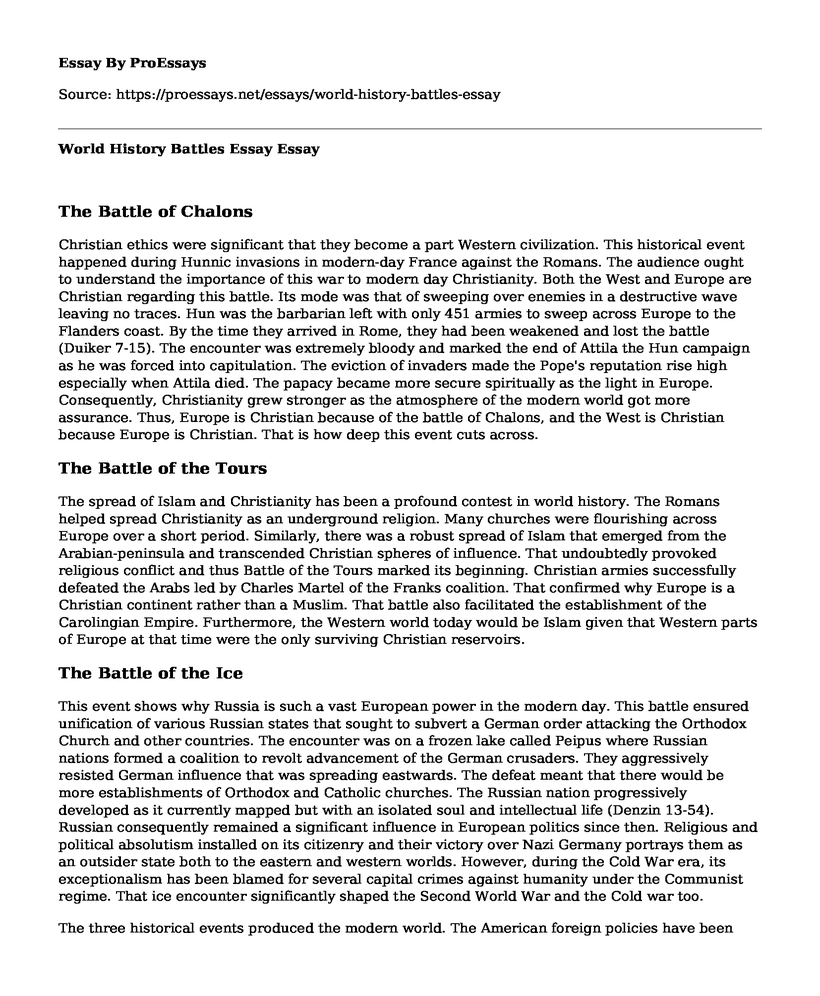The Battle of Chalons
Christian ethics were significant that they become a part Western civilization. This historical event happened during Hunnic invasions in modern-day France against the Romans. The audience ought to understand the importance of this war to modern day Christianity. Both the West and Europe are Christian regarding this battle. Its mode was that of sweeping over enemies in a destructive wave leaving no traces. Hun was the barbarian left with only 451 armies to sweep across Europe to the Flanders coast. By the time they arrived in Rome, they had been weakened and lost the battle (Duiker 7-15). The encounter was extremely bloody and marked the end of Attila the Hun campaign as he was forced into capitulation. The eviction of invaders made the Pope's reputation rise high especially when Attila died. The papacy became more secure spiritually as the light in Europe. Consequently, Christianity grew stronger as the atmosphere of the modern world got more assurance. Thus, Europe is Christian because of the battle of Chalons, and the West is Christian because Europe is Christian. That is how deep this event cuts across.
The Battle of the Tours
The spread of Islam and Christianity has been a profound contest in world history. The Romans helped spread Christianity as an underground religion. Many churches were flourishing across Europe over a short period. Similarly, there was a robust spread of Islam that emerged from the Arabian-peninsula and transcended Christian spheres of influence. That undoubtedly provoked religious conflict and thus Battle of the Tours marked its beginning. Christian armies successfully defeated the Arabs led by Charles Martel of the Franks coalition. That confirmed why Europe is a Christian continent rather than a Muslim. That battle also facilitated the establishment of the Carolingian Empire. Furthermore, the Western world today would be Islam given that Western parts of Europe at that time were the only surviving Christian reservoirs.
The Battle of the Ice
This event shows why Russia is such a vast European power in the modern day. This battle ensured unification of various Russian states that sought to subvert a German order attacking the Orthodox Church and other countries. The encounter was on a frozen lake called Peipus where Russian nations formed a coalition to revolt advancement of the German crusaders. They aggressively resisted German influence that was spreading eastwards. The defeat meant that there would be more establishments of Orthodox and Catholic churches. The Russian nation progressively developed as it currently mapped but with an isolated soul and intellectual life (Denzin 13-54). Russian consequently remained a significant influence in European politics since then. Religious and political absolutism installed on its citizenry and their victory over Nazi Germany portrays them as an outsider state both to the eastern and western worlds. However, during the Cold War era, its exceptionalism has been blamed for several capital crimes against humanity under the Communist regime. That ice encounter significantly shaped the Second World War and the Cold war too.
The three historical events produced the modern world. The American foreign policies have been facing significant challenges in other parts of the world especially states allied to Russia. The Battle of the Ice earned it supremacy that still runs up-to-date. Moreover, the terrorist menace is anchored in religion. Primarily, expressed as a battle of opposing beliefs especially between Christians and Muslims. Therefore, the Battle of the Tours describes a fundamental period in which the conflict has never been solved. As in America, the popular culture in religion portrays Muslims as terrorists and directly relates to the events of the ancient encounter. Additionally, the Battle of the Chalons depicts why the Pope is among the most influential people on earth. His office symbolizes the power of widespread Christianity as a significant influence on the world.
Works Cited
Denzin, Norman K., and Yvonna S. Lincoln, eds. The Sage handbook of qualitative research. Sage, 2011.
Duiker, William J., and Jackson J. Spielvogel. World history, volume II: Since 1500. Cengage learning, 2012.
Cite this page
World History Battles Essay. (2022, May 17). Retrieved from https://proessays.net/essays/world-history-battles-essay
If you are the original author of this essay and no longer wish to have it published on the ProEssays website, please click below to request its removal:
- DuBois and Washington Essay Sample
- Analysis Essay Sample on Greek and Roman Comedy Through the Works of Plautus
- Battle of Natural Bridge - Essay Sample
- Essay Example on WW1: Britain & France Divide the Middle East
- Essay on Colonization's Impact: William Easterly's White Man's Burden
- Research Paper on Cold War: USSR vs US: Forty Years of Tension
- Essay Example on Mystery of the Ancient Egyptian Pyramids: A Wonder of the Ages







